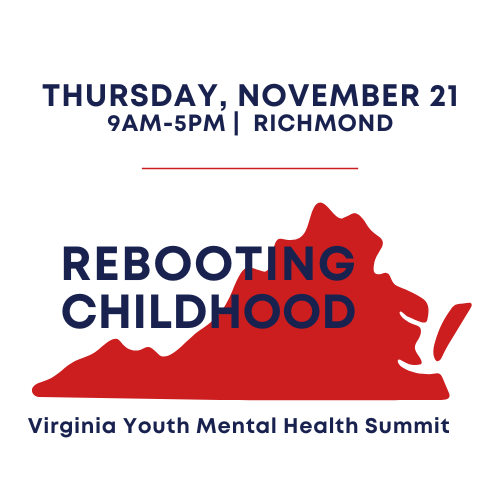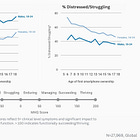The (Other) Pro-Life Movement
Children & Young Adults are in danger. Church, what are we going to do about it?
As you may know, the early Christian church faced much persecution in the Roman Empire. In a culture where children were commonly discarded in trash heaps to die, Christians stepped into these hard places and rescued children. These followers of Jesus went against culture and protected the vulnerable. Sadly, this had not always been the mark of a person following Gold Almighty. In Leviticus 18:21, the Israelites were commanded to not sacrifice children to Molech, an ancient pagan god. Despite this warning, we are told in 2 Kings and in Jeremiah that the Israelites had in fact participated in the practice of placing children onto fiery altars.

In modern America, we look at child sacrifice, a common practice in the ancient world, and are disgusted by the depravity and violence that it entails. The pro-life movement in our culture is based upon the Biblical principle that all human life has value as we are all made in the image of God. Christians vote, pray, and advocate for the unborn because of our faith. But, may I suggest there is an element of advocating and fighting for children that the Church has largely been silent on? It is protecting children from addiction, idolatry, sexual abuse, suicide and self-harm that has plagued the modern world over the past dozen years.
Take for instance these statistics:
Since 2013, “nearly 1 in 3 (girls) seriously considered attempting suicide—up nearly 60%”.1
Bucking decades long data, the highest suicide rate for any age group is now young men aged 20-24.2
An “estimated 100,000 children per day received online sexual harassment, such as pictures of adult genitalia.”3
“1 in 8 of the world's children, about 302 million young people, have been victims of non-consensual taking, sharing of and exposure to sexual images and video in the past year.”4
20% of 13-15 year olds with an Instagram have nudity pushed to them on a weekly basis.5
Since 2010, major depression for teen girls has jumped 145% and 161% for boys.6
The earlier a child gets a smartphone or tablet, the worse they report their mental wellbeing to be as they enter adulthood.7
The number of teenage girls who have “seriously considering attempting suicide” has increased 50% over the past decade.8
Social media use leads to greater loneliness and depression for girls.9
Since 2010, rates of nonfatal self-harm for children ages 10-14 has increased by 48% for boys and 188% for girls.10
For boys, “growing up in the virtual world makes them less likely to develop into men with the social skills and competencies to achieve success in the real world”.11
“Adolescents who used social media more - both overall and at night - and those who were more emotionally invested in social media experienced poorer sleep quality, lower self-esteem and higher levels of anxiety and depression.”12
All of this has come about over the last dozen years as smartphones and social media have taken over childhood and adolescence. We’ve tried parental controls, filters, time limits, “phone contracts” and more. Despite this, kids are getting worse, not better.
Why are we so afraid of speaking the truth?
I have yet to talk to a teenager with a smartphone who hasn’t been exposed to pornography and violent content. I know handfuls of parents who have uncovered damaging behaviors and addictions yet have been unwilling to permanently take back a teenager’s smartphone. Yes, when children become adults they may get a smartphone, but the data tells us that the longer we wait to give these devices to our kids, the better off they will be. According to Pew Research, teenagers report being happier without their smartphones but are unwilling (or unable?) to properly restrain themselves.
We have a crisis on our hands: teenagers are anxious, depressed, suicidal, victims of violence and sexual exploitation at rates we’ve never seen before in society. Our current trajectory is leading us, as a culture, to disaster. The ship is sinking and we are all pretending like it isn’t.

We may not be offering our children on the altar of a pagan god, but if we take the 30,000 foot view, does our culture look like one that is sacrificing or rescuing children? Are we so afraid of hurting the feelings of other adults that we won’t speak the truth for the benefit of children? We cannot continue to look at all the problems around us and hope and pray it won’t affect our kids.
Dear Christian Parent, if we value children, it’s time to be honest: smartphones and social media aren’t for kids and teenagers. Not for yours, not for mine, and not for our neighbors.
Parents, you can remove a smartphone from your child. Teachers, you can talk about smartphones as dangerous things that should be avoided during childhood and adolescence. Pastors, you can be honest with your congregations about what is happening to teenagers because of the ubiquity of smartphones. Youth leaders, you can stop talking about social media like it is something that teenagers have to “manage” and instead offer them freedom.
A decade ago, we didn’t know how this was all going to play out, but now that we do, we must act accordingly. Share these data points with your friends and family. Opt for a landline in your home. When your children are in late high school, don’t buy them a smartphone. A talk/text only phone like the Wisephone is a better choice. You can train your child’s affections for good without exposing them to harm. Don’t be the parent who sacrifices your child on the altar of technological-adoption.
To all my Virginia friends, I will be a panelist at the “Rebooting Childhood” Youth Mental Health Summit in Richmond on November 21. Registration is free! Hope to see you there!
This one-day event will delve into the pressing issues of youth mental health in today’s digital world. Gain insights, resources, and practical solutions for supporting youth across Virginia. Register TODAY!
What to Say by DCP
Looking for some quick, practical tips on how to navigate digital media in today’s culture? Each Thursday I will be posting tips in the “What To Say by DCP” section of DearChristianParent.Substack.com Because I respect your inbox, I won’t be emailing these but I hope you’ll check them out anyway. First up:
https://www.cdc.gov/healthyyouth/data/yrbs/pdf/YRBS_Data-Summary-Trends_Report2023_508.pdf
Facebook whistleblower, AfterBabel.com
Sapien Labs, Global Mind Study
Centers for Disease Control, 2023, page 64
Haidt, The Anxious Generation, pg 170
Haidt, The Anxious Generation, pg 176





